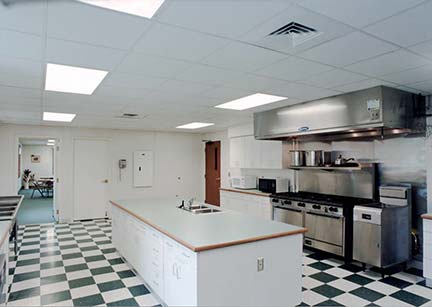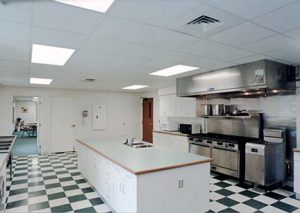
Whether they’re subject to regular inspections or not, church kitchens should incorporate a safety program into their operation and follow a Hazard Analysis & Critical Control Points (HACCP) plan.
Pamela Goldstein, vice president of operations at Nevada-based Humidity Control Systems — maker of CoolerKING, an all-natural mineral filter — also recommends that a certified food manager, or a volunteer trained in a food safety course, trains food preparation workers in safe food handling practices.
In a commercial kitchen, a licensed kitchen manager can perform these duties. “This person has to go through training and ensure that the food handling rules are followed,” says Eric MacInerney, principal and project architect at Heimsath Architects in Austin, TX. “In fact, depending on its planned uses, the church might have to consider hiring a kitchen manager.”

commercial kitchen at Hope Baptist Church in
Toledo, OH, includes a three-compartment sink, ansul hood and gas ranges.
Libby Shoop, marketing manager at Indianapolis-based C&T Design and Equipment Co., Inc., agrees. “A commercial kitchen requires a person in charge (PIC) who’s Serv-Safe-certified” — a certification offered through the National Restaurant Association, she says.
Stuart Powell, CEO and president of Oklahoma-based Cookshack, feels the same way about training. He recommends that all volunteers working in church kitchens attend a food safety course, typically offered at no cost by the local health department.
Proper equipment operation is another top-of-mind concern for Shoop and Powell. “Training in this area is so huge, especially with heavy-duty equipment,” she continues. “High heats create complex use.”
And, as Powell points out, many churches assume everyone knows how to operate certain pieces of equipment. “Take a dishwasher, for example,” he says. “There are a lot of differences between a home-use dishwasher and a commercial one.”
In the end, design experts agree the risks inherent to church kitchens are the same as in any kitchen.
“They’re dangerous places with lots of sharp and hot things in them,” says Ernest C. (Terry) Biglow, III, AIA, managing principal at CDH Partners, Inc., in Marietta, GA. “Anyone working in a church kitchen should be aware of these dangers and understand how to work in one, safely.”


